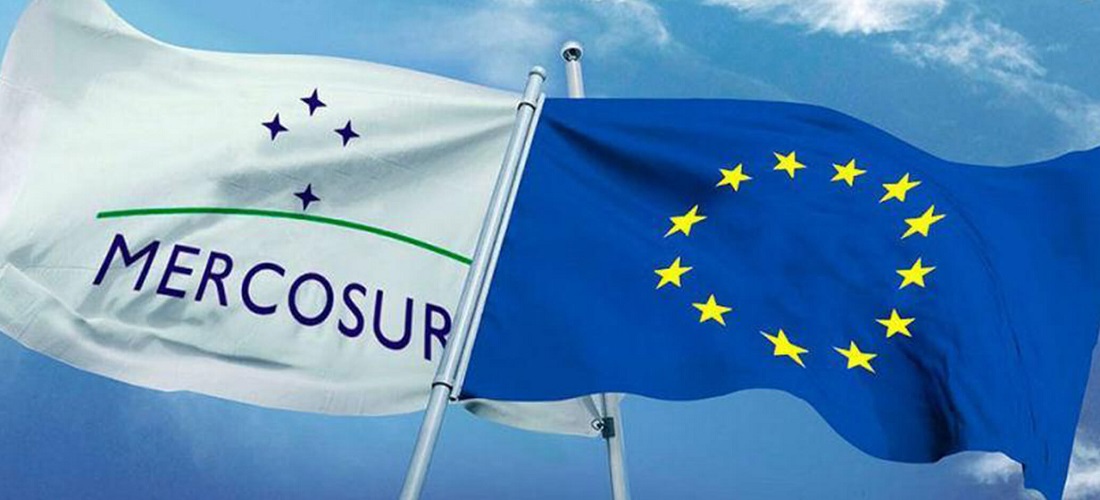
Brazil pressures the EU to give continuity to free trade agreement negotiations
Mar, 30, 2022 Posted by Gabriel MalheirosWeek 202213
The Ministry of Economy’s Secretary of Foreign Trade, Lucas Ferraz, arrived on Wednesday (30) in Madrid, Spain, with a clear message for the European Union (EU): the bloc must finally present its conditions in terms of sustainable development to move forward with the free trade agreement negotiations with Mercosur.
For Ferraz, bringing these issues to the negotiations table and finding the final impetus to implement the EU-Mercosur free trade agreement is critical at the moment, given the current geopolitical context. The secretary accompanies the Minister of Economy, Paulo Guedes, to Spain to meet with authorities.
The European Commission, the EU’s executive arm, has been hinting for months that it would present a proposal with additional environmental commitments applicable to both sides in response to severe objections from many sectors in Europe over deforestation and Amazon preservation. The plan is to include these commitments in an accompanying statement to stem the flood of opposition in Europe to the bi-regional agreement.
Recently, following the invasion of Ukraine by Russia that started on February 24, the European Commission indicated that the current geopolitical context brings to the surface the importance of moving forward with its trade agreements, including the one with Mercosur. However, it planned not to proceed with the ratification of the agreement with Brazil, Argentina, Paraguay, and Uruguay for the time being, as environmental concerns were still prevalent, especially with deforestation.
“The EU has been talking about this ‘side letter’ for more than a year, which never realized. We are always willing to dialogue, nonetheless,” said Ferraz. “What Brazil does not want to do is reopen the agreement. We will not do that. When you reopen a chapter, it unbalances the whole deal. We do not think it is necessary. But having a ‘side letter’ like the one proposed could be a way out.”
The secretary wants to use the meetings in Madrid, where the environment is favorable to the bi-regional agreement, to highlight that the new global situation “increases the strategic importance of having this agreement approved, both for Brazil and Europe.” He believes that Brazil can supply products that Europeans used to buy from Russia. “Brazil is a net exporter of oil, one of the main items on our trade agenda,” he says, also mentioning metallic commodities like steel and iron ore.
In Brussels, the feeling is that the French presidential election in April is just significant – perhaps even more important – than having the Mercosur agreement approved. One cannot rule out the possibility of the European Commission imposing additional demands on Mercosur once the election has taken place. Among possible demands are fighting deforestation and abiding by the Paris Agreement, as well as social commitments like respecting labor conventions.
“But there is no guarantee of that,” said a European source. First, there are several levels of ambition in terms of what the EU intends to present to Mercosur. The environmental sector is more ambitious, with its plans to incorporate fines if Mercosur fails to follow through on its obligations. On the other hand, the trade area tends toward something more realistic and pragmatic to suit the political necessity while also assisting increasing supplier diversity and attaining deconcentration. Second, some European capitals remain skeptical about reopening talks on the EU-Mercosur deal ahead of Brazil’s presidential election this year. Some sectors have expressed opposition to President Jair Bolsonaro.
For his part, Secretary Lucas Ferraz notes that the current movement to reconfigure supply chains “opens a great opportunity window for Brazil” in general. For him, it is even more important for the country to improve the business environment, reduce bureaucracy, reduce Brazil’s costs and increase international insertion.
“Reconfiguration will be translated into less growth around the globe,” he noted. “It means productivity loss since it arrived from non-economic criteria like geopolitics and trade war. It displaces productive activity and, in the long run, represents less growth in the world. However, from an individual point of view, we will try to take advantage of it.”
Source: Valor Econômico
To read the full original article, please go to:
-
Mar, 15, 2021
0
Brazilian fruit exports grow 18% YoY in January
-
Grains
Jun, 22, 2022
0
Brazil black bean exports go to distance
-
Ports and Terminals
Aug, 04, 2021
0
“We lost everything that day”: a year after the Beirut port explosion, Lebanon is still trying to recover
-
Grains
Nov, 19, 2024
0
Brazil’s Interco to Export 500 Tons of Special Beans Amid Growing Global Demand

